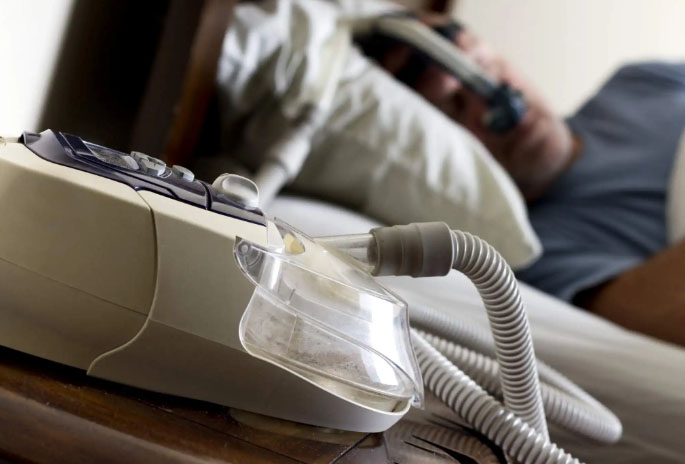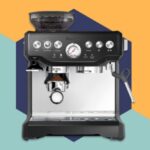The cost of the sleep CPAP machine is a typical concern at Sleep Resolutions. We place a high priority on the transparency of all of our services, especially when it comes to charges. We aim to provide you with all of the facts upfront to avoid surprises later on.
If the findings of your sleep study demonstrate that you have sleep apnea, your sleep specialist may recommend CPAP Therapy as part of your therapy. You must locate the ideal CPAP (Continuous Positive Air Pressure) machine for you.
What is a CPAP Machine?
Positive airway pressure (PAP) therapy includes CPAP. Doctors may advise other forms of PAP therapy using a BiPAP or an APAP machine, even though CPAP is frequently the first method used to treat sleep apnea. These devices are slightly different in how they handle sleep apnea, even though they all use pressure to keep your airway open while you’re asleep.
The mask is attached to an air compressor-equipped box-shaped device by a flexible tube. To keep your airways open, the compressor steadily pushes air into the mask. Additionally, some devices have built-in humidifiers.
Along with the CPAP machine, you’ll typically need:
- Mask: $150
- Hose: $30
- If your machine doesn’t already have one, a humidifier is $125 to $200
Expect to pay more if your doctor has recommended an automatic positive airway pressure (APAP) or bilevel positive airway pressure (BiPAP) machine. An APAP machine, as opposed to a CPAP machine, modifies its pressure to account for breathing changes while the user is asleep. Different pressure levels are used by a BiPAP machine for inhalation and expiration. Usually, they cost between $1,500 and $4,000.
What Is The Price Of A CPAP Machine?
The cost of a CPAP machine can range from $250 to $1,000 or more, with prices typically going up for the best CPAP machines with more sophisticated features. However, the majority of CPAP machines cost between $500 and $800. Bilevel Positive Airway Pressure (BiPAP) machines are generally more complex and more expensive as a result. Most BiPAP machines cost between $1,000 and $3,000, but some can cost as much as $6,000. These costs do not include accessories.
Whether you have insurance and what kind of coverage you have, if you do, will also affect how much your CPAP machine will cost. Some health insurance plans fully or partially cover the cost of the machine. Other plans only partially or not at all. This section focuses on the pre-insurance retail cost of CPAP machines.
The price of CPAP machines varies greatly depending on the features of the machine. The simplest CPAP devices are frequently referred to as “standard” CPAP devices. Of all the CPAP devices, these ones are the most affordable. They have to be manually adjusted to certain air pressure. Standard CPAP machines release air at a constant rate throughout the course of the night.
What Are The Prices Of Cpap Masks And Accessories?
According to the brand, style, and features, CPAP mask prices can vary. From $20 to $250, you can buy a mask. The price of accessories ranges from $1 for replacement filters to $300 or more for an external humidifier. Your health insurance plan might pay for some accessories and CPAP masks.
Nasal masks, nasal pillows, oronasal masks, oral masks, and full-face masks are some of the different types of CPAP masks available. It can be beneficial to let your doctor know about any preferences you may have for a particular mask style even though they can help you select the mask that offers the best fit and comfort.
Types Of Machines
BiPAP (BiLevel Positive Airway Pressure) devices work similarly to CPAP devices but have more settings options. There are two inhalation and exhalation settings on BiPAP machines. A BiPAP machine might be suggested if you struggle to exhale while using a CPAP or have specific lung conditions.
In order to help you breathe more easily throughout the night and keep your airway from collapsing, CPAP (Continuous Positive Airway Pressure) machines work by applying positive pressure to your airway.
APAP (Automatic Positive Airway Pressure) machines function similarly to CPAP machines. The main distinction is the pressure adjustment capabilities of APAP machines.
While CPAP machines only have one set of continuous pressure, patients can receive more customized air pressure. As you breathe differently throughout the night, APAP machines automatically adjust to these variations.

Why Will CPAP Machines Cost So Much In 2022?
It’s undeniably true that CPAP machines of all varieties were more easily accessible and more reasonably priced in earlier years, and there are a number of factors that have contributed to the higher prices. The COVID-19 pandemic we experienced in 2020, or more precisely, the supply chain disruptions that happened as a result of the pandemic, can be blamed for the CPAP shortage. Then, in June 2021, Philips Respironics issued a voluntary recall that is thought to have affected three to four million devices.
In addition to the already existing supply chain problems and increased demand for computer parts for the newly relocated work-from-home workforce, the recall caused an immediate and considerable spike in demand for new CPAP machines. Furthermore, a global chain of events exacerbated a semiconductor chip scarcity that had been accumulating since late 2020. Three other plant fires hampered production, as did Russia’s invasion of Ukraine, which supplied roughly half of the neon gas needed to light the lasers used to create semiconductor chips.
ResMed brought the AirSense 10 back, this time without a wireless modem, to relieve a market in need of CPAP devices. The AirSense 10 Card-to-Cloud is a less expensive approach to therapy and an effort to give those in need a more affordable machine, even though it doesn’t pair with ResMed’s MyAir app or wirelessly transmit data.
What Is The Price Of A Portable CPAP Device?
After purchasing a CPAP machine for home use, you might be interested in purchasing a portable CPAP machine for travel. You can bring this device along on quick family visits, nature excursions, and business trips. Depending on the manufacturer, model, make, and features, the price of a travel CPAP can change.
The cost of a travel CPAP machine is often not covered by health insurance because it is considered a luxury item rather than a necessary medical gadget. As a result, if you want to buy a portable CPAP machine, you should be able to use a health savings plan or pay cash. It is critical to remember that a travel CPAP is not a substitute for a traditional CPAP device meant for usage at home. The travel version is only used for short journeys.
You can order your CPAP machine quickly and easily through CPAP Supplies. Your machine and related supplies can be delivered to your door whether you are ordering through insurance or must pay out of pocket. Our customer service representatives have a thorough understanding of the devices and can assist you in choosing the best CPAP machine and accessories for your requirements.
Will Insurance Cover the Cost of a CPAP Machine?
Yes, you might be able to get your CPAP machine through insurance. Most health insurance providers, including Medicare and Medicaid, will pay for sleep apnea devices and replacement supplies. As durable medical equipment (DME), they are covered as necessary.
You will be responsible for paying out of pocket if you don’t have insurance. Fortunately, we offer the lowest possible prices, and you won’t need to wait for an insurance company’s authorization or approval.
Summary
Although there are various treatment choices available, including as fixed pressure, APAP, and BiPAP machines, a CPAP machine and its accessories typically cost between $700 and $2000.
Other machine components include a mask, tubing, humidifier, and filters. While there are more expensive CPAP cleaning devices available, cleaning supplies for the machine should cost approximately $15 and should be cleaned on a weekly basis.
CPAP devices are available at the majority of medical supply stores and online sellers. If your health insurance company does not cover the type of machine you need or if you do not have any insurance coverage, you will have to pay for it yourself.











